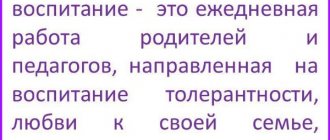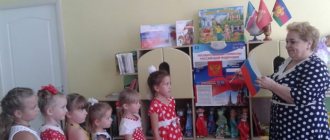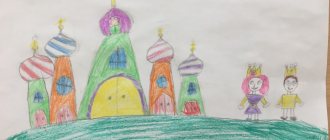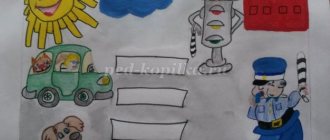Moral education in the younger group
As children move from nursery to junior group, their lifestyle changes in many ways. Their activities include drawing, role-playing, appliqué, and modeling. Children gradually move from solitary games to simple forms of joint work and play activities. Teachers at this age can already actively involve children in mandatory and systematic group activities. In class, they must learn new rules that will guide their behavior. All this will contribute to the formation of new interests, emotional experiences, and needs. And this will be of considerable importance for moral development.
Moral education in the younger group should be aimed at forming friendly friendships with friendly, polite treatment of each other, developing in children the ability to show empathy and responsiveness to their peers.
The child should feel like an equal member of the children's team. Fulfilling the same requirements for everyone helps to understand the equality of responsibilities and rights of all children in the younger group. Children most often quickly learn these requirements. They ensure the development of elements of discipline and collectivism.
A joint way of life during moral education in kindergarten should be built on the basis of common emotional experiences. Matinees, New Year's holidays, interesting games and activities bring children together and strengthen their friendships.
To form friendly relationships with peers, the teacher must actively involve children in situations that require attention, care, and sympathy. With such upbringing, children will gradually learn to take care of their comrades on their own, without the help of a teacher.
In moral education in the younger group, play becomes a school of moral behavior. Educators in games with simple plots must achieve positive moral content in the real and play relationships of children with each other, as members of a single team.
The teacher must teach children to show voluntary compliance. This is not difficult to do if you have a large number of similar objects and toys that are designed to meet the needs of all children.
During moral education in kindergarten, it is very important to accustom children to basic cooperation and to carry out collective assignments.
Municipal budgetary preschool educational institution
“General developmental kindergarten No. 19 “Firefly”
“Protection of the Blessed Virgin Mary”
(Lesson notes on spiritual and moral education in the preparatory group)
Yakovleva G.P.
teacher
2011 Program content:
- Introduce children to the history of the Feast of the Intercession of the Blessed Virgin Mary.
- Strengthen the reverent attitude of children towards the Most Holy Theotokos, Helper and Intercessor of all Christians, Patroness of the Russian Land.
- To cultivate love and respect for one’s own mother and the Mother of all people - the Queen of Heaven.
Material:
Illustrations depicting the holidays: Annunciation of the Blessed Virgin Mary, Nativity of the Blessed Virgin Mary, Entry into the Temple of the Blessed Virgin Mary, Icon of the Intercession of the Blessed Virgin Mary.
Multi-colored squares of colored paper, scissors, a disk with recordings of chants with the prayer “It is worthy to eat...”, a candle.
Progress of the lesson Educator:
My dear guys, before we start our lesson, as before starting any business, we will ask for God’s blessing:
In the name of the Father and the Son and the Holy Spirit. God bless!
- Now, sit back and listen to the poem that I. Kosyakov wrote and it’s called “She’s All”
I will read the beginning of the line, and you will finish it.
“Who loves you kids more?
Who loves you so tenderly?
And takes care of you without closing his eyes at night?
Children: “
Dear Mom.”
Educator:
Who rocks the cradle for you?
Who sings your songs?
Who tells you fairy tales?
And gives you toys? Children
: - “Dear Mom”
Educator:
If, children, you are lazy
Naughty, playful,
What happens sometimes -
Who is shedding tears then? Children: -
“She’s all my dear”
Educator:
-Yes, guys, this is all our beloved, dear mother, she cares so much about us, loves us so much. But you and I, and all the people of the Earth, also have one more mother - the Mother of God. Queen of Heaven.
-Who is the Mother of God? Children:
This is the mother of Jesus Christ.
Educator:
-That's right. Our Lady loves us and constantly prays for us before the Lord. What do we know about the Mother of God?
I will now show you pictures from our children's Gospel, and you will tell me what event from the life of the Virgin Mary is depicted here? (Hangs up a picture of the Nativity of the Virgin Mary).
Educator:
-Tell me, guys, what does this image tell us?
Children:
This is the Nativity of the Virgin Mary.
Educator:
- Correct.
What were the names of the Virgin Mary's parents? Children.
Joachim and Anna.
Educator:
- Well done. We move on to the next picture (Introduction to the Temple of the Blessed Virgin Mary).
-What event is depicted here? Children:
Introduction to the Temple of the Blessed Virgin Mary.
Educator:
- That's right. Let's move on to the next one (Annunciation).
- What do we see here? Children:
The angel Gabriel appeared to the Virgin Mary and brought Her the news that She would give birth to a Son and She would give Him the name Jesus.
Educator:
- That's right, children. At different times, in different countries, people needed the intercession of the Mother of God, received from Her the assurance that She heard their prayers, and often were even honored to see the Lady Herself.
Remember, guys, I told you about one saint - Blessed Andrew. This saint saw the Holy Mother of God on earth. And it was like that.
There was a war going on in the distant country of Byzantium. The city of Constantinople was besieged by enemies. Day and night in the City Temples, people prayed to the Lord for salvation from the enemies of their city. On one of these days, during prayer, when the Temple was full of people, Blessed Andrew and his disciple Epiphanius stood among them. Suddenly blessed Andrew raised his gaze to heaven and saw the Most Holy Theotokos walking through the air, illuminated by heavenly light and surrounded by saints and angels. The Baptist of the Lord John and the Apostle John the Theologian accompanied the Queen of Heaven.
Kneeling down, the Blessed Virgin remained in prayer for a long time. Having finished praying, She took off the cover from Her Head and spread it over all the praying people, protecting them from enemies visible and invisible. And this cover in the hands of the Lady “shone brighter than the rays of the sun.” Saint Andrew asked his disciple Epiphanius standing next to him: “Do you see the Queen and Lady?”
“I see,” answered Epiphany, “and my heart skips a beat.”
The Most Holy Theotokos asked Her Son, Jesus Christ, to accept the prayer of all people and fulfill their requests. The Lord heard His Mother’s prayer and the enemy retreated - the people were saved.
In memory of this event, a tradition was established - on October 14, to celebrate the Day of the Intercession of the Blessed Virgin Mary.
“And now they will bring in a real Icon of the Intercession of the Most Holy Theotokos for you and me.”
(they bring in the Icon - the teacher places it on the easel).
Educator:
-Children, how did the icon painter make us understand that the actions take place in the Temple?
Children:
We see Icons, the deacon, the Royal Doors.
Educator:
- How can we recognize the image of the Most Pure Lady on the Icon?
Children:
The Most Holy Theotokos is depicted in the center of the Icon; we recognized Her by her attire).
Educator:
- Is it possible to find on the Icon an image of blessed Andrew and his disciple Epiphanius?
Children:
St. Blessed Andrew is depicted barefoot, he leaned towards Epiphanius, and with one hand points to the Queen of Heaven.
Educator:
Now we will place our Icon in our holy corner and light a candle.
Today, in all the Temples of our Holy Rus', Orthodox people glorify the Mother of God with prayers and chants. We'll listen to them now too. (standing, we listen to the chant “It is worthy to eat...”) Educator:
And it is no coincidence that the Feast of the Intercession falls in the fall. The peasants worked very hard, trying to remove all the harvest from the field. Remember the proverbs about this time, about weather changes.
Children. “In autumn, one day feeds all day,”
“Autumn - eight changes”, “In autumn even the sparrow has a feast.”
Educator:
People have written many proverbs about the Intercession. After all, the Intercession in the village was considered the beginning of the onset of winter.
- “The veil will cover the earth, sometimes with leaves, sometimes with snow,”
- “Cover - first frost.”
During Pokrov, peasants tried to observe the weather in order to predict what the winter would be like.
— “On Pokrov, the wind from the east means a cold winter,”
— “Like the Veil, so is autumn.”
Just as the Most Holy Theotokos loves us, covering us with her blanket, so Mother Nature takes care of the earth and covers it first with leaves and then with a blanket of snow, protecting it from the winter cold. Every autumn, trees shed their leaves to the ground. and then the snow begins to fall.
Now we will also make a leafy blanket. (Children cut out different leaves to the music)
Educator:
- Take your leaves and go out onto the mat. Imagine, guys, that we are trees: the body is a trunk, the arms are branches, and there are leaves on the branches.
The wind blew - the “branches” swayed, the leaves trembled. The wind died down and the leaves quietly fell to the “ground.” This is how beautiful our deciduous carpet turned out.
- What holiday were we talking about today?
Children. About the Feast of the Intercession of the Blessed Virgin Mary. Educator:
What would you wish our guests in honor of the Holiday?
Children:
Love, health, peace, joy, success.
Educator:
- And I wish that with your spiritual gaze you would see this bright Veil over the whole world, rejoice in it and find joy and consolation in it.
Easter bun Holiday for children. Characters:
Grandfather
- Dima Borisov,
Baba
- Marina Makarushina,
Narrator
- Galina Pavlovna Yakovleva,
Kolobok
- Tanya Prasolova,
Wolf
- Matvey Molovichkin,
- Nastya Tasoeva,
Bear
- Narek Nerkareryan,
Bunny
- Kolya Shevchenko
Father priest
of the Church of the Apostle James, brother of the Lord, and
Blessed Prince Alexander Nevsky - Fyodor
The hall is festively decorated in the form of a spring forest, with the decoration of a hut near the central wall. Presenter
. Once upon a time there lived a grandfather and a woman, and they were very
poor. They didn’t have a pockmarked hen, it didn’t lay them
egg, they couldn’t bake an Easter bun. Here
grandfather and woman says...
Grandfather.
How, my dear, should we greet guests on Easter?
treat?
Baba
. Oh, I don’t know, dear, because we’ve been running out of flour for a long time.
read.
Grandfather.
Come on, woman, let's not be discouraged, but around the barn
Let’s face it, maybe we’ll at least get enough of it.
Storyteller.
So they did: they swept the barn,
scraped the bottom of the barrel, kneaded flour with water, with a tear
salted. They baked a Lenten bun and put it on the window,
so that it dries out before the morning. And Kolobok wakes up in the morning
the very first. Kolobok
. For some reason, grandparents are not visible. They're asleep, I guess.
They worked hard with me yesterday, they even slept through the church service.
I'll go to the temple while they're sleeping and sprinkle myself with the priest.
Holy water, at least this will make the old people happy.
Storyteller
. Kolobok jumped from the windowsill to the ground
and - let's go to church! Yes, not along the road, but straight through
forest. Here the Wolf meets him. Wolf
.
( with a player in his hands
). Hello, Kolobok, where are you going?
Are you rolling?
Kolobok
. I’m in a hurry to go to church, sprinkle myself with holy water, and
What is this?
Wolf
. Can’t you see, I’m having fun, listening to music.
It's a holiday after all, Easter!
You can have some fun too. Kolobok
.
What are you talking about, Wolf, is this how they celebrate Easter? Wolf
.and how they celebrate 7
Kolobok.
Come with me, you'll see!
Wolf.
Ok, I'm sold.
Storyteller
.
And they walked through the forest together, and the Fox met them. Fox.
How far have you gone, my sweeties?
Kolobok
. We, Foxy, are in a hurry to go to church; I'm a saint
sprinkle with water, and the Wolf - Easter music
listen. Fox.
I’ve become somewhat deaf, come to me, my friend
lean one, come closer!
Kolobok ( loudly
).
Let's go to church for the Easter service! Fox
. Of course, of course, I know - Easter is today. I'm
I also bought myself a new outfit in honor of the holiday -
I’ll flaunt through the forest, let everyone envy what I have
my skirt is colorful!
Kolobok
.
What are you talking about, Foxy, is this how they celebrate Easter? Fox.
How do they celebrate?
Koloblok.
Come with us, you'll see.
Fox
.
Well, I'll take a walk. Storyteller.
The three of them walked through the forest and soon
We met Misha the clubfoot.
Bear
.
( comes out, yawning, with a pillow
). What are you making, go to sleep
are you disturbing?
Fox.
Oh, you clubfoot, you slept through all of Christmas, you want to
Sleep through Easter!
Get up, it's spring already! Bear.
Easter - I know that, I heard that. So in
holiday they give us an extra day off so that
sleep, otherwise why else is a holiday needed? Kolobok
.
What are you saying, Misha, is this how they celebrate Easter? Misha.
How they celebrate,
Kolobok.
Come with us, you'll see - we're going to church,
Easter service.
Storyteller.
The four of them walk and talk. All of a sudden
Little Hare meets them.
Kolobok
.
Hello, Zainka, why are you so scared? Bunny.
But I don’t understand what’s steaming around? All
Are they in a hurry somewhere, why are the bells ringing so loudly?
Wolf
.
Don’t you know that Easter is today? Bunny.
But I don’t know anything yet, I was just born yesterday.
Kolobok.
And we are going to the temple for the Easter service.
Bunny.
And I'm with you!
Storyteller
. So they all came to the service together.
The animals stood in the temple without moving. What a bloody thing
what singing! And Kolobok rolled straight to the priest. (Father sits in the hall, in the first row).
Sprinkled it
Father with holy water and asks...
Father.
Where is your red egg, Kolobok?
Koloyuk.
I don’t have, father, a red testicle - mine
Grandma and Grandpa are poor.
Father.
Here, take it, Kolobok, give them one testicle.
Storyteller.
And the parishioners heard their conversation
and gave Kolobok a whole basket of eggs.
( Spectators, children from other groups, parents give the kolobok
a whole basket with colored eggs and Easter cakes).
As soon as the service ended, the animals came out of the temple and
They steal Kolobok... Wolf.
Well, Kolobok, we’ll try you now!
Fox.
Oh, and let's enjoy ourselves!
Kolobok
. What kind of unreasonable animals you are.
After all, I’m fasting: sweeping the barn, scraping the bottom of the barrel,
mixed with water, salty with a tear. How can you enjoy me?
Are you worried?
Bear.
What should we do now?
Kolobok
. Take a red egg here. Christ is Risen!
(Kolobok hands out testicles to the animals).
Animals
.
He is truly risen! (Kolobok leaves). Narrator
: Kolobok rolled home, and the animals consulted
become.
Bunny.
It was somehow inconvenient. Kolobok is our own
He gave Easter eggs, and his grandparents
poor, they have nothing to set the festive table and guests with
treat.
Wolf.
Maybe they have nothing to eat at all?
Fox
.
Maybe they have nothing to dress up in at all? Bear
. I'll go home and look for them
some kind of little trick.
Animals
.
And so do we! Storyteller.
And at that time Kolobok rolled home.
Grandfather.
Where have you been, Kolobok?
Woman.
We were very worried about you!
Kolobok.
And I was in church, I sprinkled myself with holy water
and I brought you a red egg!
(Knock on the door). Grandfather.
Who could it be? Baba
. I don’t know myself.
(loud
). Well, come in, dear guests1
(animals enter)
Animals.
Christ is Risen!
Grandfather and Baba
.
Truly risen! Kolobok.
These are my new friends.
Bear
.
I brought you honey for the holiday! Bunny.
And I'm a carrot!
Wolf
.
And I have wood for the stove - summer is not coming soon. Fox.
But for grandma, a colorful, festive scarf!
Grandfather and Baba.
Thank you, dear guests!
Happy holiday music is playing. All heroes come forward Bunny.
Today I realized how to celebrate Easter!
Wolf.
Don't amuse yourself with music...
Fox.
And not to flaunt in colored outfits...
Bear
.
And don’t sleep, rest longer... That’s it.
(
together
).And you need your kindness and joy for others
present!
Storyteller.
And then there will be a lot, a lot of kindness for the whole
the world is enough!
Children and adults sing the hymn “ Christ is Risen!” (music by I. Koshmina, lyrics by A. Maykov).
Moral education in the preparatory group
The basis of moral education in the preparatory group is a variety of collective activities in which children learn to give in and negotiate with each other, provide mutual assistance, and coordinate their actions.
In the preparatory group, the teacher can already use methods of indirect influence on the game much more widely. The teacher can already enrich the plot and establish the right relationships. When carrying out common assignments and being on joint duty, children develop the experience of collective cooperation. The teacher, using special pedagogical techniques, must create appropriate emotional experiences and feelings in the child.
For example, a teacher can involve children in preparing a postcard for a sick friend. He must emotionally explain to the children how happy his friend will be with the postcard, how he wants to meet the children.
During moral education in the preparatory group, it is very important to instill independence in the child. At the same time, the teacher must be unobtrusive and very careful. Then children will have a feeling of complete independence when choosing a course of action. Independence will help to form the child’s emotional and positive tone in the team, the balance of his behavior, and activity in relationships with peers. With the timely development of independence, preschoolers already show concern for others, active mutual assistance, and careful attitude towards things.




